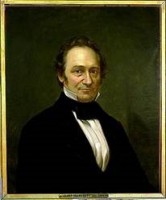
Territorial judges: an overlooked force in American law. As Willard Hurst observed, during the past 150 years lawyers have been implementers rather than creators of law. We whose days are spent staring at a screen and poring over paperwork sometimes wish we could take a way-back machine to the days of legal creationism, if only for a little while. Yet an important group of creators—judges appointed from Washington, starting in the 1780s, to establish the law in America’s far-flung, largely unsettled new territories—are nearly forgotten today. Territorial judges were often, in the words of the French observer Achille Murat, “the refuse of other tribunals” or seekers after sinecures, and if they are remembered at all it is as much for their escapades as for their jurisprudence. But some of the territorial judges, including Wisconsin’s James Doty, stand out in American political and legal history, and the vital contributions they made to institutionalizing American law are often overlooked. The book being written under the Schoone Fellowship’s auspices will attempt to remedy that.
How did territorial judges help institutionalize law? Many territorial judges were the first agents of the American legal system to appear in their new jurisdictions. Most of them faced populations that until recently had operated under French or Spanish law and were hostile to change. In long-settled areas such as Louisiana, careful negotiation of a blended system was required. Newer frontier areas, such as Doty’s Wisconsin, wanted no formal law at all. Frontier judges had to travel among widely scattered settlements—often an adventure in itself—and establish courthouses, create or prop up local law-enforcement systems, and, perhaps most importantly, instill basic respect for American law and authority. The latter task was often difficult. During his first year as a judge Doty encountered open resistance which required a physical confrontation to subdue. Other frontier judges, including Andrew Jackson in 1790s Tennessee, also had to meet and pass physical tests of authority.
Territorial judges also had to create a body of legal precedent. They had more tools to do so than is commonly realized: early territorial decisions show that in addition to Blackstone, copies of English reports and treatises and even some American reports were available on the frontier. But for many judges, precedent was based on half-remembered legal mentoring they had received in the East. Some, such as Alabama’s Harry Toulmin, filled the gap by publishing treatises and practice manuals of their own; a few, including Doty, kept journals of their decisions to pass on to successors.
Judges’ political and cultural adventures. It was common for territorial judges to plunge into politics. That was partly a function of their statutory role: the Northwest and Southwest Ordinances conferred legislative functions on judges during the first stage of territorial status. It was also a matter of necessity: men with formal education and administrative and organizational skills were rare on the frontier, and were needed to help develop economic and cultural structures as well as legal ones.
Some judges made a permanent imprint on their states’ early history. Doty became a champion of Indian rights and authored the first dictionary of the Sioux language; he became a major land developer and served as a territorial governor and congressman from Wisconsin after his time as a judge ended. After Jackson defeated the Creeks in the Red Stick War (1813-14), Toulmin helped adjust Indian relations and smooth the way for white settlement and Alabama statehood (1819). Augustus Woodward designed Detroit’s modern street plan and helped found the University of Michigan, and Henry Brackenridge of Louisiana and Florida published a number of books on philosophy and travel.
Brackenridge in a sense was a second-generation territorial judge. His father, Hugh Brackenridge, helped found Pittsburgh and, as a member of Pennsylvania’s supreme court in the 1790s, participated in the court’s efforts to extend the state’s judicial system to its central and western Pennsylvania, then in the process of settlement. A later generation would produce another great territorial judge, James Wickersham, who brought stability to gold-rush-era Alaska by clarifying and enforcing mining laws and laws governing relations between whites and Natives. After his judicial service ended, Wickersham represented Alaska in Congress and helped it create a post-gold rush economy and gain full territorial status.
The territorial legacy. Territorial judges’ legacy to American law is subterranean but real. Most territorial judges tried to implant existing American law rather than change it. Doty was one of the few exceptions: he believed strongly that American criminal law should not be applied to intramural Indian disputes. In 1830 he tried to advance that belief by overturning a verdict of murder against Menominee chief Oshkosh for killing another Indian under circumstances where tribal law permitted the killing, but Doty’s decision changed no judicial minds and effectively ended his chances of reappointment when his term expired.
State supreme court decisions quickly superseded territorial decisions, which are seldom cited today. But the seeds of American legal authority and court systems that the territorial judges planted were vital. Without them, the task of building American law west of the Appalachians, and of settling the western lands generally, would have been considerably more difficult and precarious than it was.
